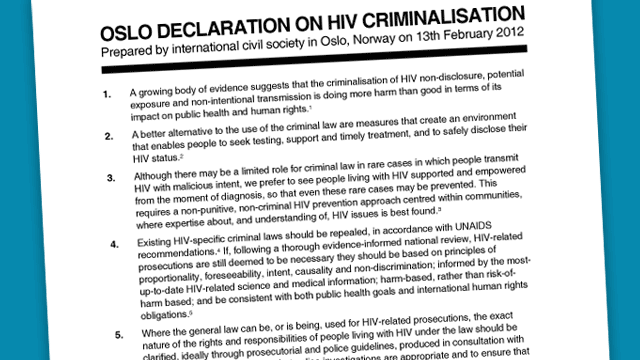About the Oslo Declaration
Find out more about the reasons for the Oslo Declaration, and why HIV criminalisation is doing more harm than good to public health and human rights.
Who is behind the Oslo Declaration?
We are a group of 20 individuals and organisations from civil society around the world concerned about the inappropriate and overly-broad use of the criminal law to regulate and punish people living with HIV for behaviour that in any other circumstance would be considered lawful. We are working to end such injustice. We are led by, and include, people living with HIV, and supported by committed HIV advocates. Our expertise covers medical, social, ethical, political, human rights and judicial issues relating to HIV and the criminal law.
Why is it called the Oslo Declaration?
We came together in Oslo, Norway, on the eve of the global High Level Policy Consultation on the Science and Law of the Criminalisation of HIV Non-disclosure, Exposure and Transmission, convened by the Government of Norway and the Joint United Nations Programme on HIV/AIDS (UNAIDS).
The objective of the High Level Policy Consultation was to provide a global forum in which policymakers and other concerned stakeholders could consider their current laws and policies regarding the criminalisation of HIV non-disclosure, exposure or transmission in light of the most recent and relevant scientific, medical, public health and legal data.
Although our declaration is not an official High Level Policy Consultation document, we support the objective of the meeting, and encourage policymakers to review their own laws and policies, and to take any and all steps necessary to achieve the best possible outcomes in terms of justice and protection of public health in order to support effective national responses to HIV and uphold international human rights obligations.
What is the current state of HIV criminalisation?
Prosecutions are taking place in many countries around the world either under HIV-specific criminal statutes or under a wide range of often inappropriate general criminal laws.[1]
Most criminal cases have been framed by prosecutors and the media as being cases of ‘deliberate’ or ‘intentional’ HIV transmission when, in fact, the vast majority have involved neither malicious intent nor alleged or even proven HIV transmission.[2]
In recent years, both the number of prosecutions, and the number of new HIV-specific criminal laws have been increasing[3] even as the public health response to HIV – based on a human rights and evidence-informed approach[4] – has significantly reduced the number of new infections and greatly improved the quality of life of people living with HIV.[5]
However, several countries are now rethinking their approach to the use of criminal law due to their awareness of advances in HIV-related science and medicine.[6]
[2] Bernard EJ and Bennett-Carlson R (2012) Op. cit.
[3] Ibid.
[4] UNAIDS (2010) Op. cit.
[5] WHO, UNAIDS, UNICEF. Global HIV/AIDS Response: Epidemic update and health sector progress towards Universal Access 2011 Progress Report. Geneva, 2011.
[6] UNAIDS. Countries questioning laws that criminalize HIV transmission and exposure. 26 April 2011; Bernard EJ. Getting tough on criminalisation. HIV Treatment Update 210, Winter 2012.
How do HIV-related criminal laws and prosecutions harm HIV prevention efforts?
Many experts have raised concerns regarding the broad, collateral harm inherent in a regulatory and criminal-based approach to HIV prevention.[7] In particular, there is evidence of a negative public health impact in terms of:
- misrepresenting and overstating HIV-related risks and harms. This contributes to increased myths about HIV, including about transmission risks and how best to protect oneself.
- increasing HIV-related stigma. This has an adverse effect on a person’s willingness to learn about, or discuss, HIV.
- undermining the importance of personal knowledge and responsibility as a key component of an HIV prevention package. Preventing HIV within a consensual sexual relationship is – and should be perceived as – a shared responsibility.
- deterring people from wanting to know their HIV status. Undiagnosed (and, therefore, untreated) HIV harms individual and public health.[8]
[8] Cohen MS et al. Prevention of HIV-1 Infection with Early Antiretroviral Therapy. N Engl J Med 2011; 365:493-505.
How do HIV-related criminal laws and prosecutions harm human rights?
There is a growing body of evidence that such laws and prosecutions are having a negative impact on all people living with HIV[9], due to:
- Creating confusion and fear over rights and responsibilities under the law.
- Creating and sustaining disincentives to disclose HIV-positive status to sexual partners.
- Creating and sustaining disincentives to disclose HIV-related risk behaviours to healthcare professionals.
In addition, evidence from around the world[10] also suggests:
- Selective and/or arbitrary investigations/prosecutions.
- Improper and insensitive police investigations that can result in inappropriate disclosure, loss of employment and high levels of distress.
- Stigmatising media reporting, including names, addresses and photographs of people with HIV not yet found guilty of any crime.
- A limited access to justice for people with HIV.
- Sentencing and penalties that are often vastly disproportionate to any potential or realised harm.[11]
[10] GNP+ (2010) Op. cit.; Bernard EJ. (2007-12). Op. cit. Bernard EJ and Bennett-Carlson R (2012) Op. cit.
[11] Strub S. HIV Is Not a Crime (documentary) 2011.
Why does HIV criminalisation particularly harm women?
Politicians and policymakers may believe that they are protecting women from HIV by proposing and enacting HIV-specific criminal laws. But HIV criminalisation does not protect women from coercion or violence. Laws that empower women by creating societal, legal, and financial equality for women, and criminalising marital rape do. HIV criminalisation does more harm than good for women because:
- Women are more likely to be prosecuted, since they are often the first in a relationship to know their status due to routine HIV testing during pregnancy, and are less likely to be able to safely disclose their HIV-positive status to their partner as a result of inequality in power relations, economic dependency, and high levels of gender-based violence within relationships.[12]
- Women with HIV face the possibility of being prevented from becoming pregnant, and/or for being prosecuted for passing HIV on to their child in the womb, or during breastfeeding, further constricting their reproductive choices and rights.[13]
[13] Heywood TA. State HIV disclosure forms legally inaccurate. Michigan Messenger, 7 February 2011; Heywood TA. Missouri backs off use of HIV client acknowledgment form. Michigan Messenger. 23 May 2011.
Where can I learn more about HIV criminalisation?
All of the supportive evidence to our statements can be found in the references, which link to the original documents. Please also explore the hivjustice.net, hivjusticeworldwide.org, and HIV Justice Toolkit websites for everything you need to know about, and to advocate against, HIV criminalisation.
Read and support the Declaration
The Oslo Declaration is currently available in English, French, German, Italian, Mandarin, Portuguese, Russian and Spanish.
- Read the Declaration online
- Download as PDF in English
- Download as PDF en français
- Download as PDF auf Deutsch
- Download as PDF in italiano
- Download as PDF 普通话
- Download as PDF em português
- Download as PDF на русском
- Download as PDF en español
- Download as PDF Latviešu valoda
- Download as PDF Türkçe olarak
- Sign the Declaration
Watch the video
Advocates working to end inappropriate criminal prosecutions for HIV non-disclosure, potential or perceived exposure and non-intentional transmission from around the world explain why they support the Oslo Declaration on HIV Criminalisation.
Video produced by georgetown media
Meet some of our original endorsers. They support the Oslo Declaration because...
Photos: Ole Magnus Kinapel
Sign-up
You can add your support to the Oslo Declaration as an individual, an organisation, or both.
If you are signing on only as an organisation, please include the name of the organisation in the Name field.
If you include your website, it will appear as a live link to your name/organisation.
Recent signatories
Ferhat Doğrugören
Cem
Berfin
Diren Yildiz
Mahmut Han Sarıtaş












